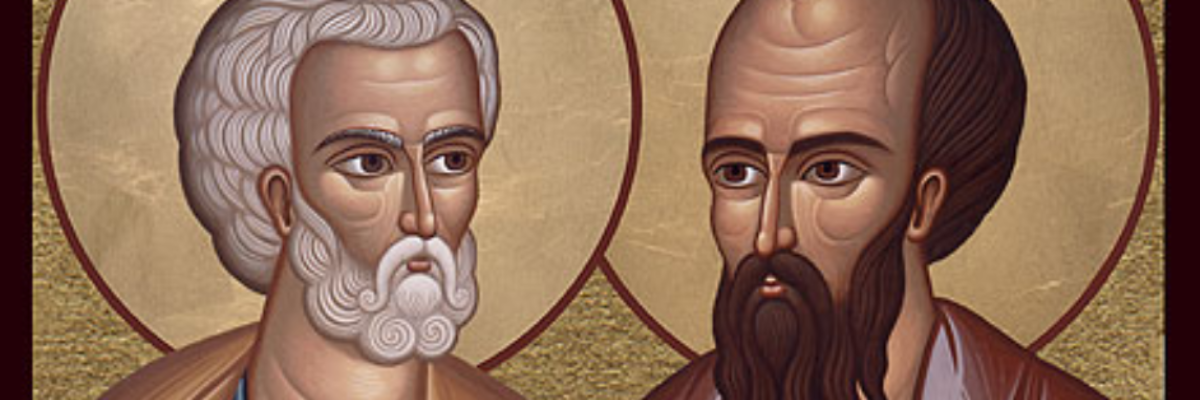
There are many arguments that Protestants make against the Papacy. One is what might be called “Petrine hiddenness.”
The argument is not that Peter is hidden in the New Testament. Rather, it’s that if Peter were the first pope like Catholics say he was, then the New Testament would mention such a Petrine office when it would have been pertinent to do so. But since it doesn’t, Peter must not have been the first pope.
Here are a few common places in the New Testament where some Protestants turn to in order to make this argument.
- Paul’s list of the different ministries in the Church: “God has appointed in the church first apostles, second prophets, third teachers, then workers of miracles, then healers, helpers, administrators, speakers in various kinds of tongues” (1 Cor. 12:28). Nowhere does Paul refer to a papacy. In fact, Paul identifies the “apostles,” not “Peter,” as the first order of ministers.
- Paul’s letter to the Romans: Paul never mentions the papacy, he never says anything about Peter in association with the Church of Rome, and his references to preaching the Gospel to the Church of Rome (Rom. 1:15) suggest that he didn’t believe Peter was already the bishop of Rome.
- Paul’s farewell address in 2 Timothy 4:6-11: Paul identifies many that have “deserted” him and affirms, “Luke alone is with me.” If Peter were the Bishop of Rome, then Paul would not have said that only Luke remained with him.
Let’s see how we can answer each of these in turn.
If we were to follow the logic of the challenge concerning Paul’s list of the different ministries in the Church, we would have to conclude there are no “presbyters,” no “bishops,” and no “deacons” in the Church, since Paul also fails to mention these as existing ministries in the same passage. But yet we know such ministries existed (presbyters—Acts 15:6, bishops—1 Tim. 3:1, and deacons—1 Tim. 3:8-10). Therefore, Paul’s failure to mention Peter’s unique role as pope when listing ministries in the Church isn’t evidence against it.
Moreover, Paul provides a similar list of ministries in Romans 12 and leaves out some of the ministries that he listed in 1 Corinthians 12. He writes,
Having gifts that differ according to the grace given to us, let us use them: if prophecy, in proportion to our faith; if service, in our serving; he who teaches, in his teaching; he who exhorts, in his exhortation; he who contributes, in liberality; he who gives aid, with zeal; he who does acts of mercy, with cheerfulness (Rom. 12:6-8).
Notice he doesn’t mention apostles, workers of miracles, healers, administrators, or speakers of various tongues, all of which he mentions in 1 Corinthians 12. And some of the ministries his lists here in Romans 12 he leaves out in 1 Corinthians 12: “he who exhorts,” “he who does acts of mercy,” etc. This reveals that Paul didn’t intend these lists to be exhaustive. And since Paul wasn’t trying to be exhaustive in his list of ministries in the Church, his lack of mentioning the papacy is not evidence against it.
Paul’s lack of reference to Peter in his Letter to the Romans also doesn’t count against the Petrine ministry. Paul’s letters were restrictive in nature. They weren’t meant to deal with everything that pertains to the Christian Faith. As such, Paul’s failure to mention the papacy can’t be evidence against it.
Furthermore, much of the content that makes up Paul’s letters is ordered to dealing with issues that caused strife in the local churches. Silence about papacy in Paul’s Letter to the Romans could be due to the simple fact that Peter’s role as the first pope was not an issue that needed to be dealt with.
But what about how Paul never mentions Peter in association with the Church of Rome? You would think that if Peter were the Bishop of Rome Paul would have addressed him in his letter.
The problem with this objection is that it assumes the only reason Paul wouldn’t address Peter is if he’s not the bishop of Rome. But it’s possible Paul doesn’t address him for other reasons.
Perhaps Peter wasn’t the Bishop of Rome yet, and wouldn’t hold this apostolic see until sometime after Paul’s letter, which was written around A.D.54. Although the historical evidence doesn’t support this, it at least provides an alternative explanation as to why Paul wouldn’t address Peter without denying fact that Peter was the Bishop of Rome at the time Paul penned his letter.
Another explanation is that Peter wasn’t in Rome due to his apostolic travels. We know from Peter’s first letter that he traveled throughout various regions in Turkey: Pontus, Galatia, Cappadocia, Asia, and Bithynia (1 Pet. 1:1). Paul’s correspondence with the Corinthians reveals that Peter also ministered in Corinth for some time during his ministry (1 Cor. 1:12; 3:22; 9:5; 15:5). Therefore, it’s possible that Paul doesn’t address Peter because Peter wasn’t there due to his apostolic travels.
Now, an argument can be made that Paul does reference Peter in his Letter to the Romans, just not in an explicit way. In Romans 15:19-22, Paul writes,
From Jerusalem and as far round as Illyricum I have fully preached the gospel of Christ, thus making it my ambition to preach the gospel, not where Christ has already been named, lest I build on another man’s foundation . . . This is the reason why I have so often been hindered from coming to you (emphasis added).
The implication here is that Christ’s name had already been preached in Rome. And it wasn’t preached just by a group of Christians (perhaps Christian Jews who returned to Rome after the Feast of Pentecost in Acts 2). Rather, Paul asserts an individual preached Christ’s name (“lest I build on another man’s foundation). This is why Paul busied himself with preaching the Gospel in other places besides Rome, “from Jerusalem and as far round as Illyricum” (Rom. 15:20).
Now, this individual couldn’t have been Paul, since he’s talking about “another man’s” foundation. Moreover, Paul had not been to Rome yet (“I have longed for many years to come to you”—v.23; cf. Rom. 1:13). So, whom could Paul be referring to as the one whose foundation he didn’t want to build upon?
Well, if we turn to the historical evidence, it’s Peter. We know from extra-biblical sources that Peter was involved in founding the Church of Rome. St. Irenaeus writes, “We put to confusion all those who . . . assemble in unauthorized meetings, by indicating that Tradition derived from the apostles, of the very great, the very ancient, and universally known Church founded and organized at Rome by the two most glorious apostles, Peter and Paul” (Against Heresies 3:3:2, A.D. 189). If Peter is said to be involved in founding the Church, and Paul implies that he’s not the one who did it (Rom.15:20), then the “other man” spoken of by Paul in Romans 15:20 must have been Peter.
There’s another way to make a reasonable inference to the same conclusion. Consider that the person Paul has in mind as having already preached Christ’s name to the Christians in Rome is likely to have been an apostle, since Paul views this “other man” as having the same apostolic status as himself (if this man were of a lower status, then Paul wouldn’t be concerned about treading on his evangelistic groundwork). Also, we know Rome was a place with a large Jewish population before Claudius expelled them in A.D.49. So, whomever Paul has in mind here most likely would have been a prominent evangelist interested in evangelizing Jews.
Peter is the only apostle other than Paul that fits this description, and Peter’s specific mission was to minister to the circumcised: “Peter had been entrusted with the gospel to the circumcised” (Gal. 2:7-9). Peter, therefore, is the most reasonable referent of Paul’s statement in Romans 15:20.
Finally, what should we make of Paul’s comment that only Luke remained with him in his last days (2 Tim. 4:6-11)? Does this show that Peter wasn’t with him in Rome?
First, Paul is not saying that all Christians left him alone. He only speaks of his assistants in the ministry: Demas, Crescens, and Titus.
Demas was a “fellow worker” with Paul, according to Philemon 24. Titus was the famous “partner” and “fellow worker” with Paul (2 Cor. 8:23), to whom Paul writes an epistle. Although Crescens is unknown, we can reasonably infer that he was also one of Paul’s assistants, given the fact that his name appears in a list of names that were assistants to Paul, including Luke. Since Paul is only referring to his assistants in the ministry, his exclusion of Peter as not being with him wouldn’t count as evidence that Peter wasn’t in Rome because Peter wasn’t a member of Paul’s circle of fellow workers.
Second, even if we concede for argument’s sake that Paul was saying there were no apostolic figures with him in an absolute sense, it doesn’t prove Peter was never in Rome because there is evidence that Peter was already dead at the time Paul penned this letter.
Paul wrote his letter either the summer or early fall of the year he died, which was A.D. 67. There is evidence that Peter died before Paul, some time around A.D. 65 or 66 (Pseudo-Abdias, Passion of Saint Paul 8; Augustine, Sermons 295:7, 299A:1, 381). If Peter died before Paul penned this letter, then we have a plausible explanation as to why Paul doesn’t mention him: he’s dead.
Like the other references, Paul’s lack of reference to Peter in his farewell address in 2 Timothy 4:6-11 fails also as evidence against Peter being in Rome.
Given that the appeal to Paul’s’ failure to mention the papacy in 1 Corinthians 12:28 leads to an absurd conclusion, and that Paul’s silence about the papacy and Peter in his Letter to the Romans and his farewell address in 2 Timothy 4:6-11 can be explained by alternative explanations that are more plausible, the argument from Petrine hiddenness fails, and a Catholic is still justified in assenting to the Catholic understanding of the papacy as a truth of history and revelation.



